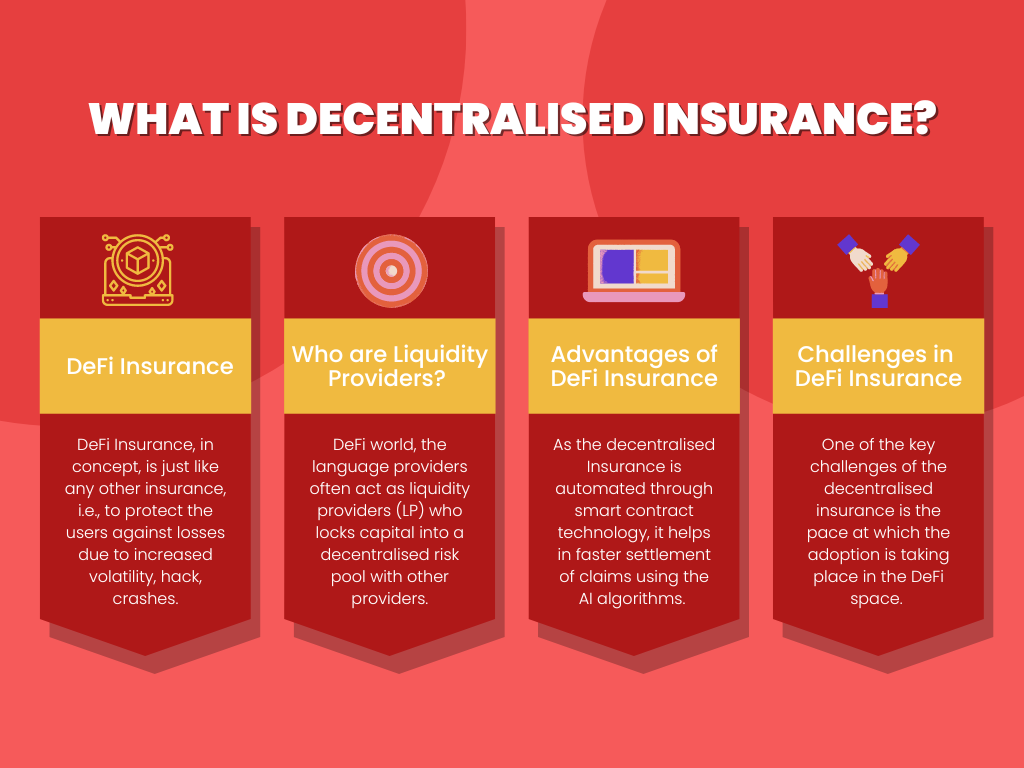What is DeFi Insurance, and what are its key features?
In the race toward Web3 adoption and advancement, decentralised finance (DeFi) has a critical role. With some key characteristics such as immutability, transparency, self-custody etc., DeFi and Web3 are expected to reshape how consumers manage their finances completely.
While DeFi had a breakout year in 2021, leading to the growth of non-fungible tokens as well, it is believed that it’s time that many projects turn their attention to the further development of the two in the years to come. In fact, many DeFi projects are now adopting NFTs to enhance its store value and serve as immutable proof of ownership.
While the growth of DeFis & NFTs was the town’s talk in 2021, one emerging technology that could gain prominence in the coming years could be the rise of DeFi Insurance.
What is DeFi insurance?
DeFi Insurance is just like traditional insurance, i.e., to protect oneself against losses due to increased volatility, hacks crashes etc. In DeFi insurance, the language providers often act as liquidity providers (LP) who locks capital into various decentralised risk pools with other providers.
 Image credit: Source: ©Kalkine Media®; ©Vunira via Canva.com
Image credit: Source: ©Kalkine Media®; ©Vunira via Canva.com
The coverage depends on crypto, smart contract risks, NFTs, DAO governance, and more. Among the few solutions that DeFi insurance provides would make sense, especially for attacks on DeFi protocols, stablecoin price crashes, exchange hacks etc. It’s an imperative mechanism, especially in a risky market such as cryptocurrency.
Benefits of DeFi insurance
DeFi insurance boasts an array of benefits for the users to take advantage of. Besides its use-case scenarios, some DeFi insurance schemes have often become valuable for its users. DeFi Insurance offers a reduction of scams as it restricts third-party involvement or intermediaries.
As DeFi Insurance is automated through smart contract technology, it helps easily settle claims using AI algorithms. Furthermore, it enhances speed as the claims are resolved faster and more seamlessly.
DeFi Insurance’s smart contracts allow an effective way to manage risks. With the decentralised system in place, one can set up a policy quickly along with the safety net using blockchain technology.
As the decentralised transactions are recorded across the distributed ledgers, it inculcates trust in the transactions and transparency. What it also does is that it removes the third-party involvement, leading to benefits from these actions being reaped by everyone.
Challenges existing in DeFi insurance
As it is still in the nascent stage, there is plenty of scope for development in the area. But one of the key challenges that the DeFi insurance space is facing is the pace at which the adoption is taking place. Besides, the ambiguity over DeFi risks is another reason for the lack of adoption. Estimating the DeFi risks makes it difficult to fix insurance premiums.
Another challenge that DeFi Insurance faces is the amount underwriters receive. In the case of DeFi insurance, liquidity provides that underwriters only receive yields in the form of insurance premiums.
Need for DeFi insurance & future
The recent stablecoin is a classic example of why the market participant may feel the need for crypto insurance. With DeFi commanding its market share in the crypto space and the growth of NFTs, DeFi Having said that, only a handful are offering DeFi Insurance. As of now, firms such as Nexus Mutual, Etherise, CDx etc., offer DeFi insurance, and it’s only a matter of time before we may see other firms jumping on the bandwagon offering similar services.
Insurance may well be one of the promising sectors due to the transparency and security features. With the DeFi sector growing, it may be just a matter of time that we see more of such firms coming into the space with more innovative offerings.
Risk Disclosure: Trading in cryptocurrencies involves high risks including the risk of losing some, or all, of your investment amount, and may not be suitable for all investors. Prices of cryptocurrencies are extremely volatile and may be affected by external factors such as financial, regulatory, or political events. The laws that apply to crypto products (and how a particular crypto product is regulated) may change. Before deciding to trade in financial instruments or cryptocurrencies you should be fully informed of the risks and costs associated with trading in the financial markets, carefully consider your investment objectives, level of experience, and risk appetite, and seek professional advice where needed. Kalkine Media cannot and does not represent or guarantee that any of the information/data available here is accurate, reliable, current, complete, or appropriate for your needs. Kalkine Media will not accept liability for any loss or damage as a result of your trading or your reliance on the information shared on this website.